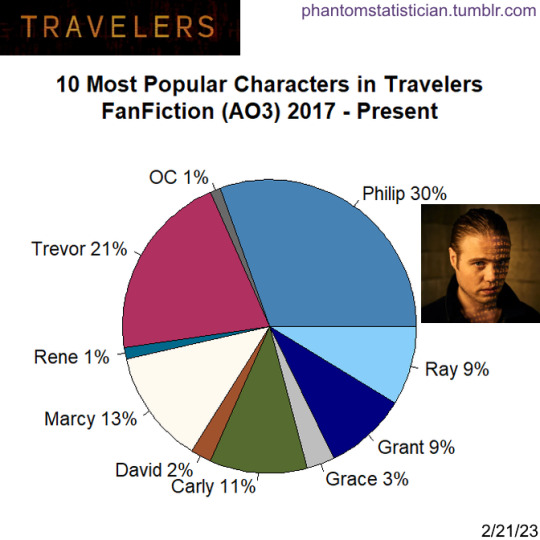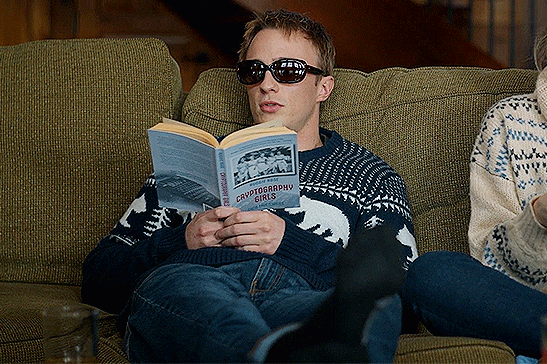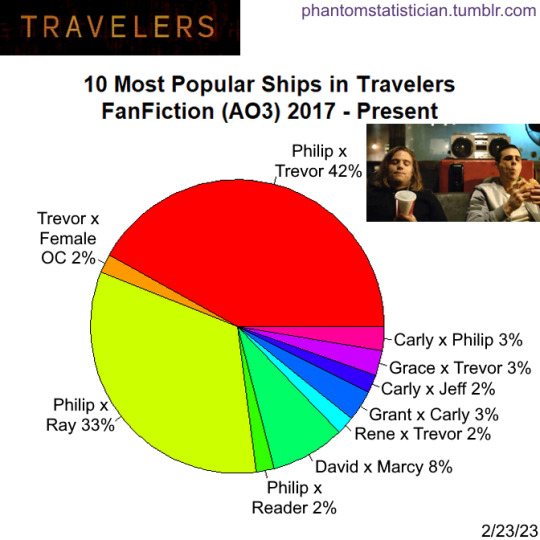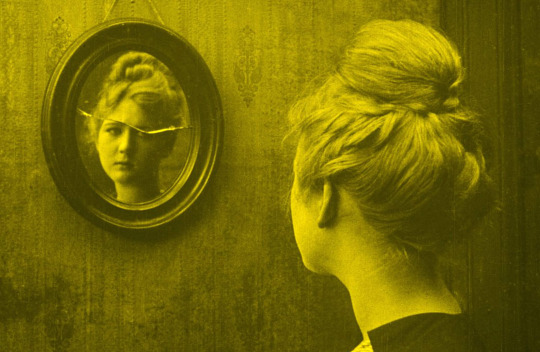#Grant MacLaren
Explore tagged Tumblr posts
Text
Literally why does Grant put so much effort into staying with Kat? With the way he constantly gaslights her into believing she’s crazy and with how he literally drugs her whenever he needs her to forget she’s chosen not to be with him, it can’t be love.
Their relationship takes away from the show and his lack of respect for her autonomy makes Grant a worse character every time they show him interacting with her. I want to believe this is all for some commentary about how protocol 2 can lead to creepy obsession with the host’s loved ones, but no one ever calls him out on it
#travelers netflix#grant maclaren#Kat maclaren#Philip Pearson#Marcy Warton#Carly Shannon#Trevor Holden#grace day
28 notes
·
View notes
Text



#travelers netflix#netflix travelers#he’s just so serious all the time so i made these with my friends when we rewatched#grant maclaren
4 notes
·
View notes
Text
i really need someone to rant abt grant maclaren with
really all of them but like why do I get so attached the shows thatw were cancelled years ago
i love them all so much
#travelers netflix#grant maclaren#Carly Shannon#the rest of them I cant think of their names off the top of my head
6 notes
·
View notes
Photo

Fandom: Travelers
Sample Size: 208 stories
Source: AO3
#philip pearson#trevor holden#marcy warton#carly shannon#grant maclaren#ray green#grace day#david mailer#rene bellamy#travelers#fanfiction#ao3#statistics#phantom statistician
36 notes
·
View notes
Text






Travelers 2x3 Jacob (2017)
2 notes
·
View notes
Text

Person A: "Good morning! Did you sleep well?"
Person B: "....Did you fucking sedate me?!"
2K notes
·
View notes
Text





Zach maclaren being a cutie potato🎀
#zach maclaren#my boyfriend drew starkey#drewstarkey#golden retriver boyfriend#coquette#dolette#lana del ray aka lizzy grant#coquette dollete#rafe cameron
25 notes
·
View notes
Text
Hey everyone...
So I decided to write here too... You can also find me on wattpad, the username is Wolfie_200510 and the profilepic is the same as here.
❤️🔥 - smut
💖 - fluff
❤️🩹 - angst
With who I write:
OBX characters
- JJ Maybank
- John B
- Rafe Cameron
- Pope Hayward
- Sarah Cameron
- Kiara Carrera
- Cleo Anderson
- Sofia
Or with the OBX actors
Some other Drew Starkey characters:
- Trevor
- Zach Maclaren
Rules for requests:
- No male reader, only female or gender neutral reader
- No dad/mom character x child reader (sorry)
- But I write mom!reader x mom/dad!character
- No major age gaps (like more than 10 years age gap)
- I'm open to write kinks
- No ships or character x character
#rafe cameron x reader#drew starkey x reader#trevor hellraiser x reader#zach maclaren x reader#jj maybank x reader#rudy pankow x reader#john b x reader#pope heyward x reader#sarah cameron x reader#kiara carrera x reader#cleo anderson x reader#sofia x reader#chase stokes x reader#jonathan daviss x reader#fiona palomo#carlacia grant#madelyn cline#madison bailey#outer banks#obx#outer banks x reader#obx x reader
2 notes
·
View notes
Text
...Christ, in His sweetness and His gentle sustaining help, comes near to us all across the sea of sorrow and trouble. A more tender, a more gracious sense of His nearness to us is ever granted to us in the time of our darkness and our grief than is possible to us in the sunny hours of joy. It is always the stormy sea that Christ comes across, to draw near to us; and they who have never experienced the tempest have yet to learn the inmost sweetness of His presence. When it is night, and it is dark, at the hour which is the keystone of night’s black arch, Christ comes to us, striding across the stormy waters. Sorrow brings Him near to us. Do you see that sorrow does not drive you away from Him!
Alexander MacLaren; Commentary on John 6:16-21
#Alexander MacLaren#John 6:19#John 6#i can attest to this#this means so much to me#dark night of the soul#God is with us even now#jesus christ#Sorrow#Divine sorrow#i love this so much#do not despair#do not be afraid#Biblical commentary
23 notes
·
View notes
Text
I really felt like both Maclaren and Yates unnecessarily made it more difficult for each to do their jobs, because neither of them would just put their freakin' cards on the table.
Arguably, you could say Traveler 001 was the root cause of the absolute fuckery that was the ending of the Version 1 timeline, so Version 2 will hopefully do better.
Did it annoy anyone else when Yates said it was the travelers fault the world was ending? I mean she has a point, but it’s not like the FBI didn’t try to undermine and obstruct their missions multiple times before they started ‘helping’.
16 notes
·
View notes
Text
The first time I watched this show, I didn’t really care about shipping, but this time around I’m thinking about it and I’m kind of all in on a Carly-Philip-Trevor casual V shaped polyamory thing.
#someone please get that musty old Grant MacLaren away from Carly right now#travelers netflix#Carly Shannon#Trevor Holden#Philip Pearson
10 notes
·
View notes
Text

Music For the Soul by Alexander MacLaren
The Comforting God
"Comfort ye, comfort ye My people saith your God" — Isaiah 40:1
This magnificent chapter is the prelude or overture to the grand music of the second part of the prophecies of Isaiah. Its first words are its keynote: " Comfort ye. comfort ye My people." That purpose is kept steadily in view throughout; and in this introductory chapter the prophet points to the one foundation of hope and consolation for Babylonian exiles, or for modern Englishmen, to that grand vision of the enthroned God "sitting on the circle of the earth, before whom the inhabitants thereof are as grasshoppers."
"They build too low who build beneath the sky."
For nations and for individuals, in view of political disasters or of private sorrows, the only hold-fast to which cheerful hope may cling is the old conviction, " The Lord God Omnipotent reigneth."
Notice how, first, the prophet points to the unwearied God; and then his eyes drop from Heaven to the clouded, saddened earth, where there are the faint and the weak, and the strong becoming faint, and the youths fading and becoming weak with age. Then he binds together these two opposites - the unwearied God and the fainting man- in the grand thought that He is the Giving God, who bestows all His power on the weary. And see how, finally, he rises to the blessed conception of the wearied man becoming like the Unwearied God. " They shall run, and not be weary; they shall walk, and not faint."
And let me say, here is a lesson for us to learn of meditative reflection upon the veriest commonplaces of our religion. There is a tendency amongst us all to forget the indubitable, and to let our religious thought be occupied with the disputable and secondary parts of revelation rather than with the plain deep verities which form its heart and centre. The commonplaces of religion are the most important. Everybody needs air, light, bread, and water. Dainties are for the few; but the table which our religion sometimes spreads for them is like that at a rich man’s feast - plenty of rare dishes, but never a bit of bread; plenty of wine and wine-glasses, but not a tumblerful of spring water to be had. Every pebble that you kick with your foot, if thought about and treasured, contains the secret of the universe. The commonplaces of our faith are the food upon which our faith will most richly feed.
And so here, in the old, old Word, that we all take for granted as being so true that we do not need to think about it, lies the source of all consolation-the Hope for men, for churches, for the world. We all have times, depending on mood or circumstances, when things seem black and we are weary. This great truth will shine into our gloom like a star into a dungeon. Are our hearts to tremble for God’s truth to-day? Are we to share in the pessimist views of some faint-hearted and little-faith Christians? Surely as long as we can remember the name of the Lord, and His unwearied arm, we have nothing to do with fear or sadness for ourselves, or for His Church, or for His world.
5 notes
·
View notes
Text
"I'm not gonna sit here and pretend to know what makes us who we are. But I gotta figure it's more than just the sum of what we remember." -- Grant MacLaren / Travelers (2016-2018) #SaturdayMovieTVQuote
2 notes
·
View notes
Photo

Fandom: Travelers
Sample Size: 148 stories
Source: AO3
#philip pearson#trevor holden#ray green#david mailer#marcy warton#carly shannon#grant maclaren#grace day#jeff conniker#rene bellamy#travelers#fanfiction#ao3#statistics#phantom statistician#philip x trevor#trevor x philip
28 notes
·
View notes
Text
The Top 10 of the '10s (Part 4)
Alright, after much procrastination and rambling about movies I don’t even like, it’s finally time to talk about my #1 of the 1910s. This is a good one, so settle in.
1. Shoes (1916, dir. Lois Weber)

Women had an odd place in early film. When these films were being made women in America, and all over the world for that matter, were still fighting for the right to vote. Yet they were still granted creative roles in filmmaking in its early years. Before the industry was fully established and by extension respected, writing and directing roles were open to women. It wasn’t until film became a “high art” that filmmaking suddenly became a man’s job. All the women who wanted a role in filmmaking (that wasn’t acting) usually settled for editing, something incredibly important that many of those in power considered a simple menial task (Women really did hold the majority of editing positions in early filmmaking, and by a wide margin at that. The ripples of this are still felt in editing today). Lois Weber was fortunate enough to come in right at the end of the wave of female creatives in film. Weber had a very interesting life and career but for brevity’s sake let’s just zoom in on this one movie.
Shoes is a film about a woman who wants to buy… a pair of shoes. It’s not a war epic that spans decades and sets worth millions of dollars, and it didn’t change the world when it came out. What it is though, is a compelling story that stands out amongst its peers and feels decades ahead of its time while still uniquely commenting on the state of society in the 1910s. Shoes is about Eva Mayer (played by the very talented Mary MacLaren). She works for a shitty department store that only pays her $5 a week. Using that $5 she must try to provide for both her parents and her little sister, as her father is a bum who is happy to leech off of her rather than get a job himself. He sits back and relaxes while his entire family struggles to get by, living paycheck to paycheck, all-knowing he’s responsible but not able to speak up to the man of the household. Eva gives everything she has for other people and wants something for herself. She wants a pair of shoes. Her current pair are falling to pieces, just like her life and mental state are. On her current wages, she simply can’t afford it, her life does not allow for such privileges. She gets the opportunity to sell her body for a night in order to get the money to buy new shoes and after much anguish finally agrees to do it.
Shoes is a simple story, the film itself is only 50 minutes long and could be much shorter if it was just the basic story. But Shoes is more than that. The film is made in small moments. It’s made in the anguish and the anger of being a woman, the moments when we get to see Eva exhausted and empty. Unlike some of the other films on this list, Shoes is never trying to impress you, it’s just trying its best to communicate what it wants to say effectively. This film is shot gorgeously and goes so much further and more experimental in its visual language than so many other films, especially for such a grounded story. Weber understands that cinema itself is a unique language. So many movies of this time just felt like filmed stage plays, the best of them felt like an evolution of them, but the very very best like Shoes, felt like something completely new. The camera is a free agent to move the flow of the film wherever it wants to go.
The worst thing a silent film can be is packed with unnecessary intertitles, just explaining how a character feels or what they’re thinking (D.W. Griffith was very guilty of this), but Shoes tells you everything you need to know about the state of the characters purely visually. And none of this visual storytelling feels like it sacrifices how grounded the story needs to be. Weber opted to use fully furnished sets rather than the corner sets which were standard at the time and it goes a long way to make this place feel lived in. Weber builds up the world in Shoes, knowing that it’s identical to ours, but needing to show it from a different perspective. Shoes is unique in its character study. Something so focused in on exploring one person’s life and psyche was rare in the entire silent era, let alone just the 10s. But I don’t think I like Shoes just because it stands out from its competition. It’s just a damn good film. And it combines the form of this era with the kinds of storytelling that wouldn’t be found in film until decades later. The result of this marriage of ideas is a film that isn’t quite like anything else I’ve seen. It has the depth and complexity of storytelling that I expect from later films but retains the visual language of silent film, one interested in simple striking images and the need to convey a lot through physical performance. The silent form forces the film to play straight for emotion at all times, no time is spent wasted on exposition or any other bland unnecessary aspects, instead, every frame of the film is focused on drawing out emotion in a complex and psychological story. For me, Shoes represents everything great about filmmaking in the 1910s and beyond. It’s a wholly unique film, and one I would be quick to recommend to most people.
I hope through this retrospective I’ve done a good job explaining not only why this era is important but why it is worth watching. It’s an entirely different kind of filmmaking than what we have today and is still quite different even when compared with the 20s. It’s something that film fans should at least investigate once in their lives, as it’s an important step in understanding how and why we got to where we are now.
3 notes
·
View notes
Text
Dibuja tu nombre en mi piel
Si te gustan los libros de romance histórico, este libro esta saga es para ti.
Duncan McPherson llega a las tierras del clan MacLaren porque allí se celebra una reunión para fomentar nuevas alianzas entre clanes. Allí Elisa MacLaren, una joven que iba distraída, choca con el Laird McPherson y sin querer hace que este se caiga al barro.
Mientras la reunión transcurre, Duncan se da cuenta de que se ha enamorado de la joven, ocho años después de haber perdido a su mujer y a su hijo recién nacido. Por otro lado Elisa, se está enamorando de Duncan pero, como durante mucho tiempo su familia le ha hecho sufrir mucho, se prometió a sí misma que no se enamoraría para evitar que alguien más la dañara emocionalmente.
Un día, Elisa recurre a su primo Grant MacLaren, jefe del clan, para explicarle que la madre de Elisa se puso en contacto con ella diciendo que la necesitaba, Grant al principio se negaba a que Elisa fuera con su madre, ya que esta última no había hecho de madre nunca. De repente, Duncan se presenta en el despacho de Grant y explica que oyó la conversación que mantenían Elisa y Grant y entonces Duncan se ofrece a llevar a Elisa con su madre y asi se asegura de que llega sana y salva.
De camino a casa de la madre de Elisa, Duncan le expresa a Elisa lo que siente por ella, pero ella le dice que no siente lo mismo por él. Cuando llegan a tierras MacKintosh (donde se aloja la madre de Elisa), dejan a Elisa con su madre y Duncan y sus hombres vuelven a su clan. Los días transcurren, y unos mercenarios llegan y hablan con el jefe del clan y sin querer Elisa presencia la discusión que mantienen el jefe del clan con el jefe de los mercenarios y ve como asesinan a uno de los hombres de MacKintosh. Cuando el jefe de los mercenarios se entera de que Elisa ha presenciado su acto, va corriendo a darle una paliza que casi la mata,
La madre de Elisa preocupada por el estado de su hija, le pide ayuda a la prima de Duncan para sacarla de allí y llevarla con Duncan. Una vez en tierras McPherson, Irvin (el primo de Duncan) la lleva con Duncan y entonces la curandera y el jefe McPherson cuidan de ella. Mientras Elisa descansa, la prima de Duncan le explica a Duncan sobre los mercenarios y unos días más tarde Duncan y sus hombres van a hacer justicia.
Finalmente, Elisa le confiesa a Duncan que está enamorada de él desde el día que se conocieron, entonces celebran una boda breve y pasan una maravillosa noche de bodas.
Es la segunda vez que leo este libro y la verdad es que lo volvería a leer mil veces más. Simplemente me ha encantado.
Espero que te haya gustado esta reseña. Nos vemos en la próxima lectura :)

1 note
·
View note